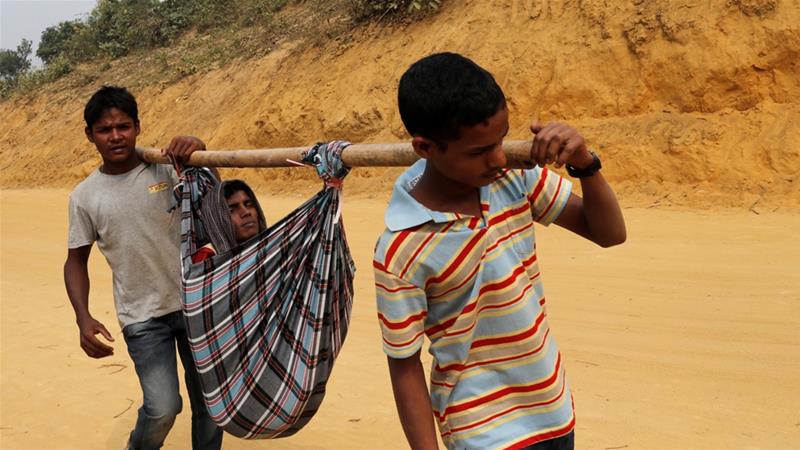Myanmar should be investigated for crimes against Rohingya - UN
UN: Myanmar should be investigated for crimes against Rohingya
Zeid Ra'ad al-Hussein also calls on Myanmar to allow monitors in to investigate suspected 'acts of genocide'.
The UN human rights chief has called for all atrocities committed against Myanmar's Rohingya to be referred to the International Criminal Court (ICC) for prosecution.
Prince Zeid bin Ra'ad Zeid al-Hussein, who has previously described Myanmar's campaign against the Rohingya as a "textbook case of ethnic cleansing", also urged the country to allow monitors into restricted areas to investigate what he called suspected "acts of genocide".
If they want to disprove the allegations of serious violations against the Rohingya, "invite us in" to Rakhine State, Zeid told a news conference on Friday in Geneva.
"We are saying there are strong suspicions that, yes, acts of genocide may have taken place. But only a court can confirm this," the UN High Commissioner for Human Rights added. Al-Hussein's comments come after Myanmar National Security Adviser Thaung Tun said on Thursday that "if it was genocide, they [Rohingya] would all be driven out".
He added: "We have often heard many accusations that there is ethnic cleansing or even genocide in Myanmar. And I've said it before and I'll say it again - it is not the policy of the government, and this we can assure you. Although there are accusations, we would like to have clear evidence."
Ro Nay San Lwin, a Rohingya activist, said the UN's announcement was "long overdue."
"It is very important to prosecute Myanmar leaders at the ICC and to end this ongoing genocide," Lwin told Al Jazeera.
"More than a million Rohingya are seeking justice. The Myanmar military and government have been committing crimes against humanity and genocide for over 40 years. Not only against the Rohingya, but also against Kachin, Karen, Shan and other ethnic minorities.
"As a Rohingya activist, we want to see Myanmar's Senior General Min Aung Hlaing and de facto leader Aung San Suu Kyi in court at the Hague," he added.
Nearly 700,000 have fled
The Rohingya, viewed by the UN and the US as one of the most persecuted communities in the world, have face widespread discrimination from Myanmar authorities.Since August, more than 650,000 Rohingya have fled to neighbouring Bangladesh after the country's military cracked down on the minority in northern Rakhine State.
Those fleeing have brought with them accounts of rape, torture, arson and killings by Burmese soldiers and vigilante gangs.
Doctors Without Borders (MSF) has estimated that at least 6,700 Rohingya were killed in the first month of the crackdown alone.
According to recent satellite imagery, more than 360 Rohingya villages had been partially or completely destroyed since August, with at least 55 villages completely bulldozed, removing all traces of buildings, wells and vegetation.
Myanmar's military says the crackdown was needed to root out Rohingya armed rebels who attacked border police posts in August, killing about a dozen people.
In January, Myanmar and Bangladesh announced a repatriation deal, but rights groups and Rohingya have raised concerns about the agreement, saying it does not guarantee full citizenship, or safety, for those who return.
Prior to the current exodus, tens of thousands of Rohingya had already been living as refugees in several neighbouring countries.
U.N. Myanmar expert wants genocide investigation
Yanghee Lee, in a report submitted to the United Nations Human Rights Council, said she was “increasingly of the opinion that the events bear the hallmarks of genocide and therefore calls in the strongest terms for accountability.”
“The government leadership who did nothing to intervene, stop, or condemn these acts must also be held accountable.”

Comments
Post a Comment